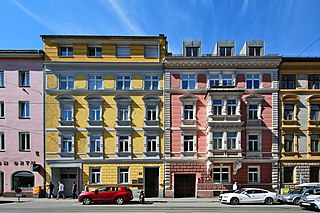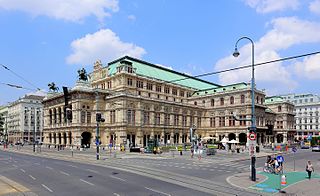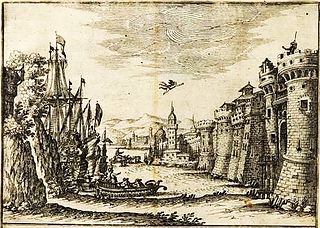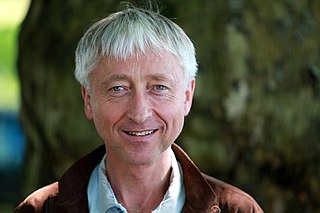
Antonio Salieri was an Italian composer and teacher of the classical period. He was born in Legnago, south of Verona, in the Republic of Venice, and spent his adult life and career as a subject of the Habsburg monarchy.

Innsbruck is the capital of Tyrol and the fifth-largest city in Austria. On the River Inn, at its junction with the Wipp Valley, which provides access to the Brenner Pass 30 km (19 mi) to the south, it had a population of 132,493 in 2018.

Heinrich Isaac was a Netherlandish Renaissance composer of south Netherlandish origin. He wrote masses, motets, songs, and instrumental music. A significant contemporary of Josquin des Prez, Isaac influenced the development of music in Germany. Several variants exist of his name: Ysaac, Ysaak, Henricus, Arrigo d'Ugo, and Arrigo il Tedesco among them.
Pietro Cesti, who later adopted the name Antonio Cesti, known today primarily as an Italian composer of the Baroque era, was also a singer (tenor), and organist. He was "the most celebrated Italian musician of his generation".

The music of Slovakia has been influenced both by the country's native Slovak peoples and the music of neighbouring regions. Whilst there are traces of pre-historic musical instruments, the country has a rich heritage of folk music and mediaeval liturgical music, and from the 18th century onwards, in particular, musical life was influenced by that of Austria-Hungary. In the 19th century, composers such as Ján Levoslav Bella began to write romantic music with a Slovak character. In the twentieth century, there were a number of composers who identified with Slovak culture. After the fall of communism in 1989–90 the country also began to develop its own popular music scene in Western style.

Vienna has been an important center of musical innovation. 18th- and 19th-century composers were drawn to the city due to the patronage of the Habsburgs, and made Vienna the European capital of classical music. Joseph Haydn, Wolfgang Amadeus Mozart, Ludwig van Beethoven, Franz Schubert and Johann Strauss II, among others, were associated with the city, with Schubert being born in Vienna. During the Baroque period, Slavic and Hungarian folk forms influenced Austrian music. Vienna's status began its rise as a cultural center in the early 16th century, and was focused on instruments including the lute.

Opera in German is that of the German-speaking countries, which include Germany, Austria, and the historic German states that pre-date those countries.

James Conlon is an American conductor. He is currently the music director of Los Angeles Opera, principal conductor of the RAI National Symphony Orchestra, and artistic advisor to the Baltimore Symphony Orchestra.

Paul Hofhaimer was an Austrian organist and composer. He was particularly gifted at improvisation, and was regarded as the finest organist of his age by many writers, including Vadian and Paracelsus; in addition he was one of only two German-speaking composers of the time who had a reputation in Europe outside of German-speaking countries. He is grouped among the composers known as the Colorists.
Giovanni Buonaventura Viviani was an Italian composer and violinist. He worked in the court at Innsbruck as a violinist at least between 1656 and 1660. Between 1672 and 1676 he was director of the court music at Innsbruck, which, after the extinction of the Tyrolean Habsburgs, had come under the control of the emperor. Although in publications of 1678 Viviani still described himself as holding this position, it seems more likely that he was in fact in Venice working on his arrangement of Francesco Cavalli’s Scipione affricano and his own opera Astiage, which were both performed in Venice that year. Also that year, Viviani directed an oratorio at the Oratorio di San Marcello in Rome with Arcangelo Corelli and Bernardo Pasquini. He was probably elevated to the nobility in the same year, since he subsequently designated himself ‘Nobile del Sacro Romano Imperio’. Between 1678 and 1679 and 1681 and 1682 he was in Naples as director of a troupe of opera singers, and while he was there he performed some of his own operas and oratorios. In 1686 he was maestro di cappella to the Prince of Bisignano. From January 1687 to December 1692 he was maestro di cappella of Pistoia Cathedral.
Bartolo Musil is an Austrian baritone singer and composer, born in Klagenfurt.

The Innsbruck Festival of Early Music is a festival of historically informed performances of music from the late Renaissance, Baroque and early Classical periods which takes place annually in Innsbruck, Austria. It was founded in 1976.

Gian Carlo Menotti was an Italian-American composer, librettist, director, and playwright who is primarily known for his output of 25 operas. Although he often referred to himself as an American composer, he kept his Italian citizenship. One of the most frequently performed opera composers of the 20th century, his most successful works were written in the 1940s and 1950s. Highly influenced by Giacomo Puccini and Modest Mussorgsky, Menotti further developed the verismo tradition of opera in the post-World War II era. Rejecting atonality and the aesthetic of the Second Viennese School, Menotti's music is characterized by expressive lyricism which carefully sets language to natural rhythms in ways that highlight textual meaning and underscore dramatic intent.

Martin Dvořák was born in Brno in 1979. He received his professional dance education at the Dance Conservatory in Brno, from which he graduated in 1997. He advanced his education at the Anton Bruckner Privat University in Linz where he enrolled in the master's degree program in Contemporary Dance Movement Research. As a dancer, Dvořák is versatile in various dance styles. He collaborated on a number of projects with the following companies:

L'Argia is an opera in a prologue and three acts composed by Antonio Cesti to a libretto by Giovanni Filippo Apolloni. It was first performed in the court theatre at Innsbruck on 4 November 1655 to celebrate the visit of Queen Christina of Sweden who was on her way to exile in Rome. Over the next 20 years it had multiple performances in Italian cities including Venice and Siena where it inaugurated Siena's new opera house in 1669. Its first performance in modern times took place at the Innsbruck Festival of Early Music in 1996. Set on the Island of Cyprus in ancient times the opera's convoluted plot, full of disguises and mistaken identities, revolves around the amorous misadventures of Selino who has been pursued to Salamis by his deserted wife Princess Argia.
Giovanni Filippo Apolloni was an Italian poet and librettist. Born in Arezzo, he has sometimes been referred to as "Giovanni Apollonio Apolloni", but the second given name is spurious. He served as the court poet to Ferdinand Charles, Archduke of Austria at Innsbruck form 1653 until 1659. On his return to Italy he entered the service of Cardinal Volumnio Bandinelli. After Bandinelli's death in 1667 Appolloni was in the service of the Chigi family in Rome and Siena for the rest of his life. He wrote the librettos for a number of operas, the most well-known of which were Antonio Cesti's L'Argia and La Dori, as well as several oratorios and the texts for cantatas by both Cesti and Alessandro Stradella.

La Dori, overo Lo schiavo reggio is a tragi-comic opera in a prologue and three acts composed by Antonio Cesti to a libretto by Giovanni Filippo Apolloni. It was first performed in the court theatre at Innsbruck in 1657. The story is set in Babylon on the shores of the Euphrates and is a convoluted tale of mistaken identities—a female protagonist who disguised as a man eventually regains her lost lover, and a man disguised as a woman who causes another man to fall in love with him. In several respects it resembles the plot of Cesti and Apolloni's earlier opera L'Argia and foreshadows Apostolo Zeno's libretto for Gli inganni felici (1695) and Metastasio's libretto for L'Olimpiade (1733). The first Italian staging of La Dori was in Florence in 1661 for the wedding of Cosimo III de' Medici, Grand Duke of Tuscany. It subsequently became one of the most popular operas in 17th-century Italy. The opera was revived three times in the 20th century, beginning in 1983.

Solimano is an opera in three acts composed by Johann Adolph Hasse to an Italian-language libretto by Giovanni Ambrogio Migliavacca. Loosely based on an episode in the life of Suleiman the Magnificent, the opera premiered on 5 February 1753 at the Opernhaus am Zwinger in Dresden. The lavish premiere production was designed by Giuseppe Galli Bibiena and featured Angelo Amorevoli in the title role.

Herbert Willi is an Austrian composer of classical music, whose orchestral works, concertos and chamber music have been performed internationally and also recorded. Willi composed an opera, Schlafes Bruder, for the Opernhaus Zürich.
Kurt Johann Rapf was an Austrian composer, conductor and organist.














